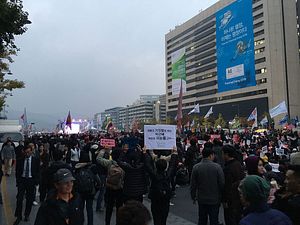Last Saturday upwards of one million Koreans poured into central Seoul to demand President Park Geun-hye’s resignation after it was revealed her longtime friend, Choi Soon-sil, bestrides state affairs. This was the largest Korean demonstration in roughly three decades and organizers have planned two more on the Saturdays ahead.
To put that number in perspective, Hong Kong’s Umbrella Revolution in 2014 was one-tenth that size and was witness to almost 500 injuries and 955 arrests. Yet despite its immense proportions, Seoul’s protests have seen just 55 injuries and no arrests.
In fact, despite the volcanic outrage pouring across the country and the near unanimity of opinion on the matter — Park now has an approval rating of 5 percent overall, and zero percent among Koreans under 30 — the demonstrations have been host to a remarkably convivial crowd. In between full-throated diatribes by speakers who visibly tremble with anger, a placid voice tells participants, “Please remember to dispose of your rubbish in the appropriate receptacle. Thank you and have a nice day.”
The crowd was also impressively organized, especially considering it’s composed of a motley assortment of interest groups ranging from the anti-religious to Green Party supporters to rice farmers, who’ve been suffering ever since Park loosened Korea’s protectionist policy toward them. These farmers are subsidized at a rate 2.5 times higher than the OECD average, but at the rally, they gathered between Namdaemun and City Hall wearing small red stickers that said, “Guarantee the Price of Rice.”
“You’re American?” a rice farmer who was the worse for drink asked as I made my way through the crowd. “Hey, hey, you wanna know why Trump won? Because Americans looked at Korea and saw how a corrupt woman has ruined our country!”
One reason such a large crowd has been able to remain so well organized and free of injury is because, for the most part, it’s relatively docile. Indeed, the mood on Saturday was predominantly festive, with many senior adults, couples, and toddlers alike waving banners, holding signs and clapping along. There were hot dogs being sold as “haya (resign) dogs,” cartons of “Stop Park Soy Milk” being handed out for free, people waving “#NotMyPresident” signs (in English), and plenty of drunken merrymaking, sing-alongs, and dancing.
“Yankee, go home!” one young man shouted as I passed, and for a brief moment, I thought I’d run across an ugly crack in an otherwise merry façade. But then he smiled in a way that indicated he had no idea what the words meant except perhaps that it was some sort of way to greet Americans. He stepped forward, warmly shook my hand, and repeated with a disarming smile, “Yankee, go home.”
I passed the main stage in front of City Hall, where the crowd was so thick it took half an hour to walk 100 meters. There was another stage at Gwanghwamun Square, where a band played anti-Park rock music and I saw a Westerner holding up a giant black-and-white sign that read (in Korean), “Believe in Jesus if you want, but keep it out of politics.”
As the evening wore on, the rally became a candlelight vigil. A group of protesters came closer to the Blue House that night than police usually permit, and there was some pushing between the crowd and armored officers, but no one was seriously injured. By around 9:30 pm, the crowd was still massive, but groups of people were already starting to leave.
The festive mood remained a constant throughout the night, and in fact, it seemed most of the people there were more interested in having a good time than anything else. That isn’t to say they weren’t angry or that their anger was without purpose, but it didn’t show. Their joyfulness wasn’t one of tactical frivolity, either. They were simply full of hope — the beating hope that their future can change because they hold the reigns of democracy in their hands. That may sound a little maudlin, but as an American, and particularly these days, it resonated.
I have my reservations about the movement. An untempered hope leads to complacency, and a political movement that coalesced after vast systemic corruption was laid bare might want to look up every once and while to make sure it doesn’t center too much on a single person’s crimes. Still and all, what was truly stunning about the demonstration wasn’t that it was so big, so peaceful, or so focused (despite its broad constituency), but that it was such a clear and open opportunity for change — and no one seemed willing to let it slip by.

































